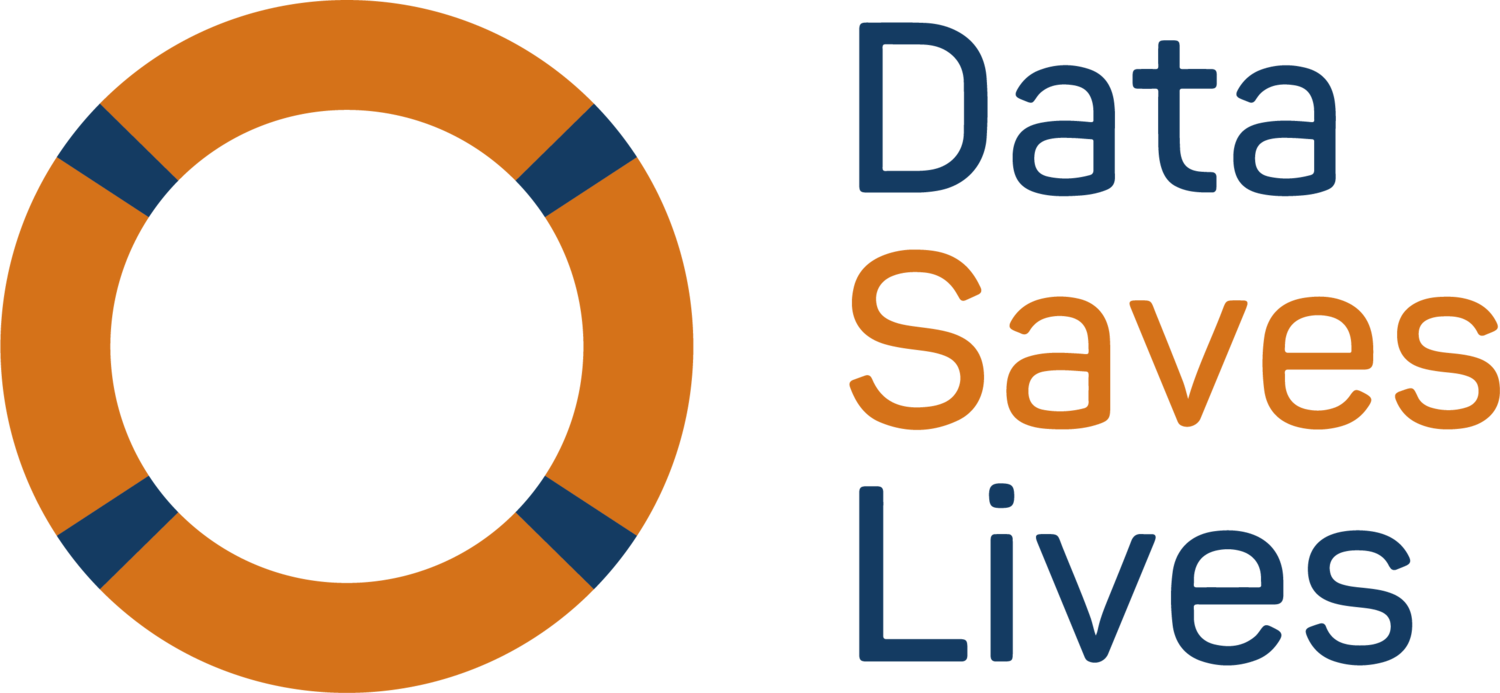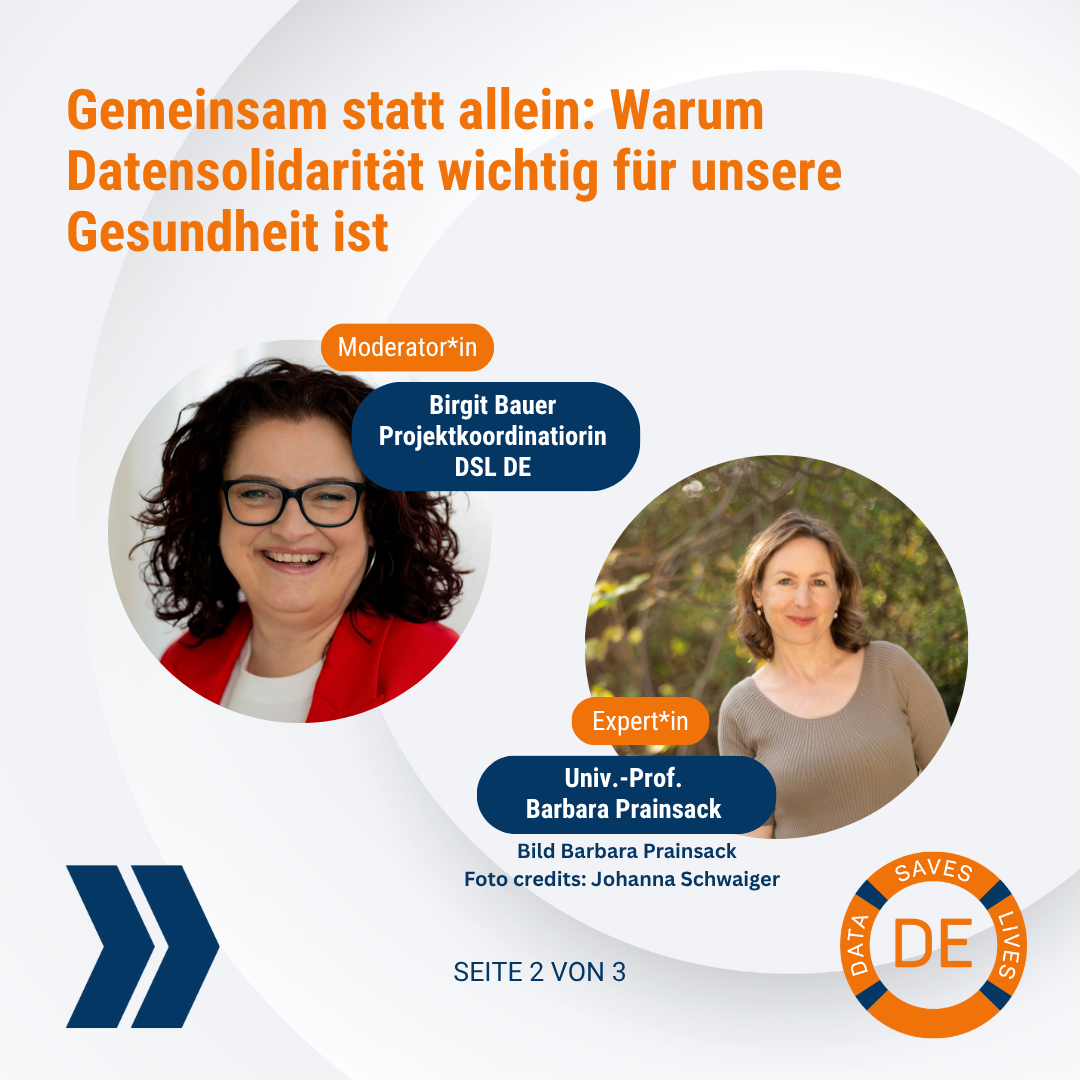Please scroll down for the English Version!
Oktober ist der Health Literacy Month – der Monat, in dem weltweit über Gesundheitskompetenz gesprochen wird: darüber, wie wir Informationen über unsere Gesundheit besser verstehen, bewerten und nutzen können.
Doch Verstehen allein reicht nicht.
Wenn wir wirklich etwas verändern wollen, brauchen wir Vertrauen und Solidarität – auch im Umgang mit Gesundheitsdaten.
Darum geht es bei Datensolidarität.
Sie baut auf Gesundheitskompetenz auf und führt sie weiter: Vom „Ich verstehe“ zum „Ich trage bei“.
Gesundheitskompetenz ist der Anfang – Datensolidarität der nächste Schritt
Gesundheitskompetenz bedeutet, dass Menschen verstehen, was mit ihrer Gesundheit passiert, und Entscheidungen treffen können.
Datensolidarität bedeutet, dass wir unsere Daten und Erfahrungen bewusst teilen, weil wir wissen: Daraus kann Forschung lernen. Und Forschung hilft uns allen – in Diagnostik, Therapie und Prävention.
Oder so gesehen:
Ohne Verstehen kein Vertrauen
Ohne Vertrauen keine Solidarität
Ohne Solidarität bleiben Daten ungenutzt
Wenn Daten ungenutzt bleiben, kommt Forschung langsamer voran - und damit auch die Entwicklung neuer Therapien oder die Versorgung selbst.
Datensolidarität stärkt das Gemeinwohl
Datensolidarität ist kein technisches Thema – sie ist ein gesellschaftliches.
Wenn wir solidarisch handeln und Daten verantwortungsvoll teilen, helfen wir nicht nur Einzelnen, sondern der gesamten Bevölkerung.
Gemeinsam können wir:
Krankheiten früher erkennen,
Trends in der Bevölkerung besser verstehen,
gezielter vorbeugen,
und in Krisen schneller reagieren.
Bei Volkskrankheiten wie Diabetes oder Bluthochdruck können geteilte Gesundheitsdaten helfen, Entwicklungen frühzeitig zu erkennen und gezielt gegenzusteuern – das stärkt Prävention und öffentliche Gesundheit.
Bei Krebserkrankungen beispielsweise zeigt sich die Bedeutung von Datensolidarität besonders deutlich:
Jede geteilte Information, jedes Forschungsergebnis kann helfen, Krebs früher zu entdecken, Therapien zu verbessernund Überlebenschancen zu erhöhen.
Das betrifft uns alle – denn Krebs ist eine Erfahrung, die viele Menschen direkt oder indirekt begleitet.
Und auch bei chronischen Erkrankungen wie Multipler Sklerose ist Wissen über Krankheitsverläufe entscheidend.
Wenn wir Daten solidarisch teilen, können wir Veränderungen früh erkennen, Therapien anpassen und so Lebensqualität langfristig sichern.
So entsteht ein Gesundheitssystem, das auf gegenseitigem Vertrauen und kollektiver Fürsorge basiert – nicht nur auf Datenbanken.
Solidarität neu denken – vom Schlagwort zur Haltung
Solidarität ist ein großes Wort. Und, ehrlich gesagt: ein schwieriges.
Viele verbinden damit Pflichterfüllung oder moralischen Druck – etwas, das man tun soll, nicht tun will.
Aber im Kontext von Gesundheit und Daten bekommt Solidarität eine neue Bedeutung.
Hier geht es nicht um Politik oder Parolen.
Es geht um das, was uns im Kern verbindet: Menschlichkeit, Vertrauen und Verantwortung füreinander.
Wenn wir über Datensolidarität sprechen, meinen wir keine leere Geste.
Wir meinen ein echtes Miteinander:
Wir teilen Wissen und Erfahrungen, damit andere daraus lernen können.
Wir helfen, Muster zu erkennen, die uns allen zugutekommen – in der Forschung, der Versorgung und in der Prävention.
Solidarität heißt in diesem Sinne:
Wir handeln füreinander – und für uns.
Damit wir alle gesund bleiben und gute Entscheidungen treffen können, wenn es um unsere Gesundheit geht.
Gemeinsam Begriffe mit Leben füllen – das Glossary zur Datensolidarität
Damit Datensolidarität nicht abstrakt bleibt, braucht es Sprache, die alle verstehen.
Darum hat Data Saves Lives Deutschland gemeinsam mit dem Data & Technology for Health Lab (DTHLab) an der deutschen Übersetzung des Glossary on Data Solidarity mitgewirkt.
➡️ Hier nachzulesen: dthlab.org/data-solidarity-glossary
Das Glossar hilft dabei, gemeinsame Begriffe zu finden – und damit auch ein gemeinsames Verständnis. Denn Verständigung ist der erste Schritt zu Vertrauen.
Einladung: Online Session mit Univ.-Prof. Barbara Prainsack
Vom Einzelnen zum Gemeinwohl – im DSL DE Kompass 2025
Auch Prof. Ilona Kickbusch betont in ihrem Beitrag im DSL DE Kompass 2025, dass Datensolidarität weit über individuelle Entscheidungen hinausgeht.
Sie beschreibt sie als eine Haltung des Miteinanders, die Forschung, Politik und Bürger:innen verbindet – zum Wohl aller.
➡️ Den DSL DE Kompass mit dem Artikel und vielen weiteren Informationen gibt es hier kostenfrei zum Download.
Wenn wir verstehen, können wir vertrauen – und gemeinsam handeln
Gesundheitskompetenz befähigt uns, zu verstehen.
Datensolidarität befähigt uns, Verantwortung zu übernehmen – füreinander, für uns alle.
So entsteht ein Gesundheitssystem, das nicht nur auf Daten basiert, sondern auf Verständnis, Vertrauen und Solidarität.
So gesehen, enn wir alle solidarisch sind, erhalten wir bessere Informationen. Wenn wir gut informiert sind, können wir Bevölkerungsgesundheit besser einschätzen. Wenn wir frühzeitig mehr über Erkrankungen wissen, können wir früher handeln – bei akuten wie bei chronischen Krankheiten
Last but not least: Wenn wir informiert sind und verstehen, können wir Krisen vorbeugen – und gemeinsam dafür sorgen, dass wir alle gesund bleiben und gute Entscheidungen treffen, wenn es um unsere Gesundheit geht.
English Version
October is Health Literacy Month – the month when people around the world talk about health literacy: how we can better understand, evaluate, and use information about our health.
But understanding alone is not enough.
If we really want to make a difference, we need trust and solidarity – including when it comes to health data. That is what data solidarity is all about.
It builds on health literacy and takes it further: from “I understand” to “I contribute”.
Health literacy is the beginning – data solidarity is the next step
Health literacy means that people understand what is happening with their health and can make decisions.
Data solidarity means that we consciously share our data and experiences because we know that research can learn from them. And research helps us all – in diagnostics, therapy, and prevention.
Or, to put it another way:
Without understanding, there can be no trust
Without trust, there can be no solidarity
Without solidarity, data remains unused
When data remains unused, research progresses more slowly – and with it the development of new therapies or care itself.
Data solidarity strengthens the common good
Data solidarity is not a technical issue – it is a social one.
When we act in solidarity and share data responsibly, we help not only individuals, but the entire population.
Together, we can:
Detect diseases earlier
Better understand trends in the population
Take more targeted preventive measures
And respond more quickly in crises.
In the case of common diseases such as diabetes or high blood pressure, shared health data can help to identify developments at an early stage and take targeted countermeasures – this strengthens prevention and public health.
In the case of cancer, for example, the importance of data solidarity is particularly clear:
Every piece of shared information, every research result can help to detect cancer earlier, improve therapies, and increase survival rates. This affects us all – because cancer is an experience that many people encounter directly or indirectly.
And in the case of chronic diseases such as multiple sclerosis, knowledge about the course of the disease is also crucial. If we share data in solidarity, we can detect changes early, adapt therapies, and thus ensure quality of life in the long term.
This creates a healthcare system based on mutual trust and collective care – not just databases.
Rethinking solidarity – from buzzword to attitude
Solidarity is a big word. And, to be honest, a difficult one. Many associate it with fulfilling obligations or moral pressure – something you should do, not want to do.
But in the context of health and data, solidarity takes on a new meaning.
This is not about politics or slogans.It is about what connects us at our core: humanity, trust, and responsibility for one another.
When we talk about data solidarity, we do not mean an empty gesture.
We mean genuine cooperation:
We share knowledge and experiences so that others can learn from them. We help to identify patterns that benefit us all – in research, care, and prevention.
In this sense, solidarity means:
We act for each other – and for ourselves.
So that we can all stay healthy and make good decisions when it comes to our health.
Filling terms with life together – the glossary on data solidarity
To ensure that data solidarity does not remain abstract, we need language that everyone understands.
That is why Data Saves Lives Germany has collaborated with the Data & Technology for Health Lab (DTHLab) on the German translation of the Glossary on Data Solidarity.
➡️ Read it here: dthlab.org/data-solidarity-glossary
But it is available in English too! So get the knowledge.
The glossary helps us find common terms – and thus a common understanding. Because understanding is the first step toward trust.
Our DSL DE Online Session about Data Solidarity …
On October 22nd on. 16.00 CET we will run our next DSL DE Online Session in German Language with Univ.-Prof. Barbara Prainsack.
For details, please refer to the images above. If you would like to participate, please register at DSL.DE@edha.academy.
From the individual to the common good – in the DSL DE Compass 2025
In her contribution to the DSL DE Compass 2025, Prof. Ilona Kickbusch also emphasizes that data solidarity goes far beyond individual decisions.
She describes it as an attitude of togetherness that connects research, politics, and citizens – for the benefit of all.
➡️ The DSL DE Compass with the article and lots more information is available here for free download.
When we understand, we can trust – and act together
Health literacy enables us to understand. Data solidarity enables us to take responsibility – for each other, for all of us.
This creates a healthcare system that is based not only on data, but on understanding, trust, and solidarity.
Seen in this light, if we all show solidarity, we receive better information. If we are well informed, we can better assess public health. If we know more about diseases at an early stage, we can act sooner – in the case of both acute and chronic diseases.
Last but not least: if we are informed and understand, we can prevent crises – and work together to ensure that we all stay healthy and make good decisions when it comes to our health.



